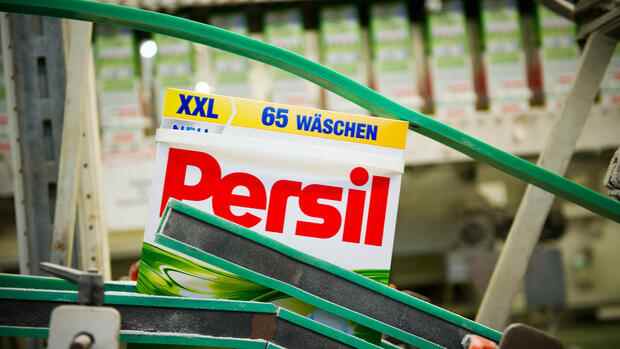Dusseldorf Henkel is burdened by rising costs for materials and logistics. The manufacturer of Persil and Pritt increased its sales by 8.9 percent to 10.9 billion euros in the first half of the year.
However, earnings before interest and taxes (EBIT) fell significantly by 18.5 percent. The bottom line is that Henkel achieved an adjusted profit of just under 1.2 billion euros. The adjusted EBIT margin fell to 10.7 percent, after 14.4 percent in the first half of 2021. This was announced by the Düsseldorf company on Monday morning.
“In an extraordinarily difficult environment, sales development in the first six months is above previous expectations for the year as a whole,” said CEO Carsten Knobel according to the company press release.
The figures show that Henkel is suffering more from the rising costs than the competition. Nivea manufacturer Beiersdorf, for example, recently reported a significant increase in both sales and profits for the first half of the year. Despite passed-on costs, increasing sales, strict cost management and further improvements in efficiency, Henkel conceded in the press release that it was not possible to fully compensate for the burdens.
Top jobs of the day
Find the best jobs now and
be notified by email.
For the year as a whole, however, Henkel is assuming that it will generate more sales than previously assumed. Henkel now expects organic sales growth of 4.5 to 6.5 percent, previously it was 3.5 to 5.5 percent. Because of the better prospects, Henkel shares rose by 2.4 percent in early trading in Frankfurt.
With regard to the EBIT margin, Henkel is sticking to its forecasts of between nine and eleven percent. Henkel had already revised these targets downwards in the spring; at the beginning of the year, the Düsseldorf-based company still expected a margin of between 11.5 and 13.5 percent.
Henkel plans to withdraw from Russia by the end of the year
Henkel’s earnings are also impacted by the withdrawal from Russia. At the end of April, after much hesitation and under great public pressure, Henkel discontinued its business in Russia. The Persil producer had invested in Russia like no other Dax group. Henkel achieved five percent of its group sales there, around one billion euros, and employs 2,500 people in eleven plants.
“Henkel is currently examining all options in detail and intends to have the process completed by the end of the year,” it said. The group is considering closing some business areas entirely, selling them, and a takeover by the management is also conceivable. The group is still producing in Russia to the usual extent.
>> Read about this: Apple, Mercedes, Miele: Western goods continue to reach Russia despite sanctions
Henkel’s adhesives division was once again the growth driver in the first half of the year. Henkel is a leader in this area. Organically, sales increased by 12.2 percent to almost 5.5 billion euros. However, the adjusted operating result fell from 820 to 743 million euros due to increased costs.
The detergents and cleaning agents division grew organically by 7.4 percent in the first half of the year. This was mainly due to the thriving detergent business. The cosmetics division increased its sales only slightly by 0.4 percent. The bottom line is that both areas made less profit due to rising costs.
The new group structure should be in place by early 2023
CEO Knobel is currently reorganizing Henkel’s consumer business. He wants to merge the ailing cosmetics business (“Dial”, “Syoss”) with the better-performing detergents and cleaning agents sector and its well-known brands such as Persil and Pril.
“In an extraordinarily difficult environment, sales development in the first six months is above previous expectations for the year as a whole,” said Henkel’s CEO.
(Photo: Henkel)
The conversion should be completed by early 2023, Knobel confirmed on Monday. Then Henkel will stand on two pillars of roughly the same size, with the adhesives business being the more profitable. The new organization should already be established in the USA in September.
Knobel wants to make Henkel’s consumer business more effective under the name “Consumer Brands”, but also reduce costs. Henkel wants to cut 2,000 jobs worldwide as part of the restructuring of the group, 300 of which will be affected in Germany.
With the conversion, the management is reacting to the cosmetics division, which has been weakening for years. Analysts had repeatedly criticized that the business was too small and not profitable enough compared to that of competitors like L’Oréal. Henkel is primarily active in the mass consumer goods business. The margins here are lower than for luxury products or high-quality skin creams, which Henkel does not offer.
More: Persil manufacturer Henkel wants to lay off more than 2,000 employees – especially in management.
